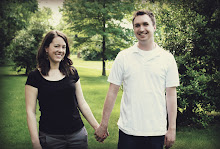I didn't win the contest; a woman named Aldra Robinson did. Her touching essay, A Witness to Grace, was published in the April 2009 issue of Real Simple; she also won $3,000. Although the extra $3k would've been nice, I was more excited about the possibility of being published in RS! But instead, a year later, I thought I'd publish my essay on my blog. So here goes: The Most Important Day of My Life.
The most important day of my life? I could write hundreds of different essays on a variety of topics – the day I graduated college, perhaps, or the day I married my husband. Maybe it was the day my grandfather died – he was my best friend, and the closest person in my life, at this point, to pass away. It could’ve been my first kiss, or my baptism, or the day I got my license (sweet freedom!). Even as I type, the memories are flooding in, each one with a unique and inexpressible impact on my life. But if I have to pick just one….
July 29, 1984. That morning I decided to make a grand entrance into this world – when my mom was just 30 weeks pregnant. Most premies (71.2 percent) are born between 34 and 36 weeks of gestation; only ten percent are born between 28 and 31 weeks. I joined the minority, tipping the scales at 2 pounds, 3 oz. I was only 14 inches long. My beloved grandfather was so scared I wouldn’t make it that he refused to visit me in the hospital; my grandmother, who was there every day, hung blue boxing gloves in my incubator. The nurses asked her if she had expected a boy. No, she replied, in her no-nonsense tone of voice. I want her to know she’s a fighter.
As a baby, being a premie meant that my parents had to order clothing and diapers from the Cabbage Patch doll company. It also meant that I spent the first two months of my life in an incubator at the hospital, allowing my mom some much-needed rest and recuperation (you’re welcome, Mom!). As an athletically-challenged, bookworm grade-schooler who was known for running into neighborhood cars (parked cars, mind you) while walking home from school because she refused to put her book down for the two-minute route, being a premie meant a fantastic excuse for getting out of gym class: I had a heart murmur. All of my doctors classified it as innocent, which was great news – until I needed it to be otherwise. The mile run just might kill me, I remember one of my friends muttering after we were informed we would have to run it in fifth grade. The mile run really could kill me, I decided, and I somehow managed to convince my mom of the seriousness of my “heart condition.” I remember grinning as I walked a few laps around the track while the rest of my classmates sweated through the run. Better safe than sorry, I insisted to my gym teacher, who didn’t seem entirely convinced of my sudden life-threatening illness.
As an adolescent, being a premie was a source of endless humiliation. The whole event was organized into a set of embarrassing facts that remained at the tip of my mom’s tongue. Every boyfriend I brought home saw pictures of me in the hospital incubator, which wouldn’t have been so bad if I didn’t look like E.T. on life support. A clean Cabbage Patch outfit and diaper were neatly stored in a drawer of the coffee table – the coffee table! – for easy access in case an opportunity for embarrassment ever presented itself (and believe me, it did).
Now? Being a premie isn’t quite the conversation-starter it used to be. In 2004, as many as 508,000 babies in the United States were born pre-term. That’s 12.5% of the baby population for the year, and a 30% increase from 1981 statistics. But despite its more frequent occurrence in recent years, premature birth is still a serious health problem. For many women, like my mom, doctors cannot determine why a baby was born prematurely. Mothers and their pre-term babies often face a litany of challenges – including developmental disabilities, cerebral palsy, and lung problems – yet I am amazed and eternally grateful that I have experienced no health problems because of my early birth (you know, besides my serious heart condition – which, by the way, doctors can no longer detect). I praise God for not only granting me life, but a healthy one at that.
The road between birth and death is a winding one. At twenty-four, I’m closer to the beginning of that road than the end (at least I hope I am!). Who knows if, in fifty years, the mountains I’ve climbed will seem quite so tall, the valleys quite so deep. At that point, there will be more memories lingering in the trees along the road – too numerous to count – each one beautifully unlike the rest; each one pivotal to my life. Perhaps then, at age seventy-four, my viewpoint will be different; perhaps I will weigh things on a different scale of importance. Perhaps not. But no matter how many years go by, my life wouldn’t be my own if I hadn’t been born on that midsummer day twenty-four years ago. My life wouldn’t be my own without those blue boxing gloves, without Cabbage Patch diapers, without ET-esque baby pictures. My life is my own because of July 29, 1984.
I’d say that’s pretty important after all.








2 comments:
I never knew, Beth.
Thank God for you!
Thanks for sharing.
I read the winning essay too...it made me cry!
oh, Beth. I think that's a great essay. I love how the day you picked influenced (and will influcnce) you throughout your life! :) Thanks for sharing!
Say something...